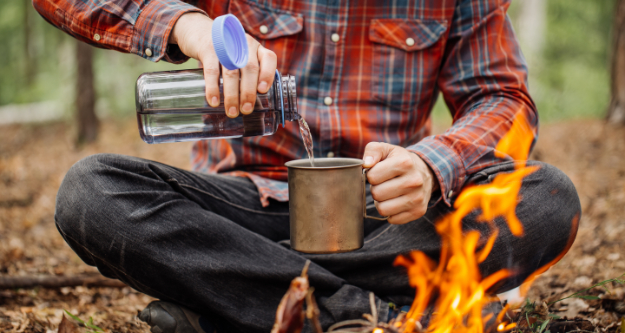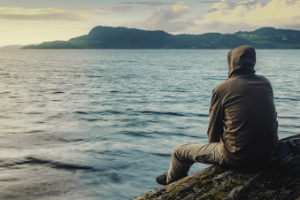
The 5 Primary Priorities for Survival
Aug 27, 2024
Jay
Survival Skills
When we are talking about survival there are a lot of thinks we have to account for, but one of the most important things you’ll have to think of are your priorities. What is the most important thing to do first, where do you have to keep your focus on, or what are the thing you could easily forget about.
In survival we speak of the 5 primary priorities; shelter, fire, rations, first-aid and rescue. These 5 are the most important things and seen as the basics of survival, you’ll have to pack for or focus on if you ever find yourself in a survival situation.
Shelter: Your First Line of Defence
Out first priority is shelter, the first line of defence against the elements such as wind, rain, snow and yes: the sun. And it doesn’t only protect us from hyper- and hypothermia, but a sturdy shelter can also give us the psychological benefit of a sense of safety and security.
And even though a nice hut is a great way of shelter, your first line is actually your clothing. Well thought trough clothes for your trip could mean a difference in comfort. More layers trap air between them and are warmer, but don’t pack them to tight. Also try to keep the layer closest to your body dry, sweat from a hike or the heat can create moisture that cools down your body.
But when it’s time to build a real structure, try to work with what you find around you. We don’t want to lug a whole encampment around so take a look around, see what resources are available, try to find any natural formations such as fallen trees or large rocks that can form the basics of your shelter.
Knowing how to build and create a good shelter is an integral skill in your survival arsenal.
Fire: Your Multi-Purpose Tool
Fire is really the king of survival, we all know it, we’ve all seen it. But have you ever really took the time to think about what it can do? It can help you purify water, cook food, provide warmth and light to bring comfort, repel wildlife, and even signal rescuers. So all this together it's crucial to know how to make fire when you are in a survival situation, and make sure you are prepared when you leave.
When you are packing for a trip always make sure you'll have at least two ways to make fire on hand, one in your gear and one on your person. This could mean matches, lighters or farro rod. But also think about tinder; a lubricated cotton ball will do a great trick to get you started. Once it's time to make your fire and you are looking around for wood always gather more than you think you'll need, experience has thought us: You'll need it!
A last great tip, when you are experiencing cold, a survival blanket could also be used to trap the warmth of your fire, instead of wrapping it around you, attach it behind you to so reflect the heath from the fire.
Rations: Sustaining Life
Obviously when we think about survival the first think that comes to mind is water, and this is not so surprising as those are indeed vital to survive. Our body is only able to survive about three days without water.
But don't go and drinks every water you find, because still water can contain bacteria and parasites that actually deprive you of water. So always filter and boil your water for about 10 minutes, with an added 1 minute for every 300m or 1000ft above sea level. And NEVER drink urine, just to have it said to you again.
Where water is indeed key to survival, food should be the last thing on your mind. You can go around 21 days without eating, and it's more important to think about your rations and spread them out if possible.
Hunger is also more mental than physical, so don't put everything on hold because you feel hungry. Your body needs food to survive, that true. But by sitting and waiting you use significantly less energy than by moving around.
Rescue: Strategies of Being Found
In any survival situation it's always important to plan for your rescue, how can you be found and what techniques are there to signal those around you.
There are many ways to signal for survival and which to use is dependent to your surroundings. Are you going to use fire, light, bright coloured markers, flags, mirrors or whistles?
Try to find a clearing to be more easily spotted by planes, during the night you can make use of strobe lights, and during the day try to think about something like a signal mirror to signal plains that fly over.
A great way is to use the fire to make a signal, besides the bonus of heat and cooking the smoke can be great way to signal your location. Making the fire in a way you normally would not want to do to create the much smoke you can.
- Use wet wood; the creation of steam makes the smoke thicker.
- Use more leaves and tree scraps; debris adds more moister and reduces oxygen flow.
- Stack logs closer; to also reduce oxygen flow.
- Use Pine Wood; It lights easily when dry, contains a lot of resin to create black smoke, and has the benefit to also leave a nice smell.
When you make use of markers, make sure they are brightly coloured and don't blend into the natural surroundings. Creating ground markers as "HELP" or "SOS" can help people identify there is something wrong. You can even improve by adding tactical signs: V stands for need assistants, X means needs medical assistants and an arrow can be added to point towards your camp or shelter.
SOS was merely a distinctive Morse Code sequence of three dots, three dashes and three dots. It later became associated with the abbreviation of “Save Our Souls” of “Save Our Ship”.
First Aid: Basic Care Saves Lives
Here it might be the last point, but is a survival situation a quick check of the need for first aid should be the first step in any situation. First Aid doesn’t only refer to medical basic needs but also mental stability and the safety of you surroundings.
Make sure you and your party are save and treat any wounds if necessary. Try to calm down and make use of the STOP methode.

Why you should STOP!
Survival Skills
It's always smart to keep two medical kits on you. A small one on your person, and a larger one in your load out. Knowing what you have in your backpack can sometimes mean the difference between safety or struggle.
Be sure you know how to use the materials, working on instinct and memory is always better than trying. Also, see what there is around you to help. You can't carry everything with you but when knowing what to do with what's in your surroundings and how to use it could be a great skill in your survival arsenal.
Our last tip; Try to prevent difficult and dangerous situations instead of fixing it.
